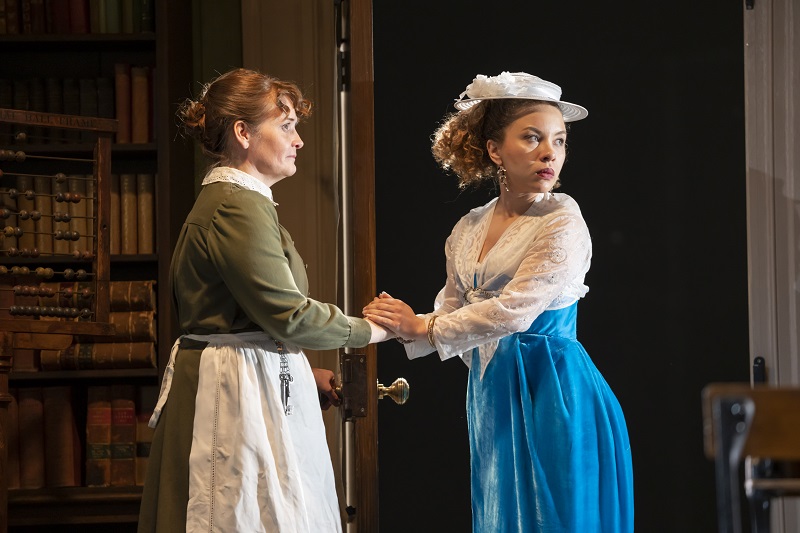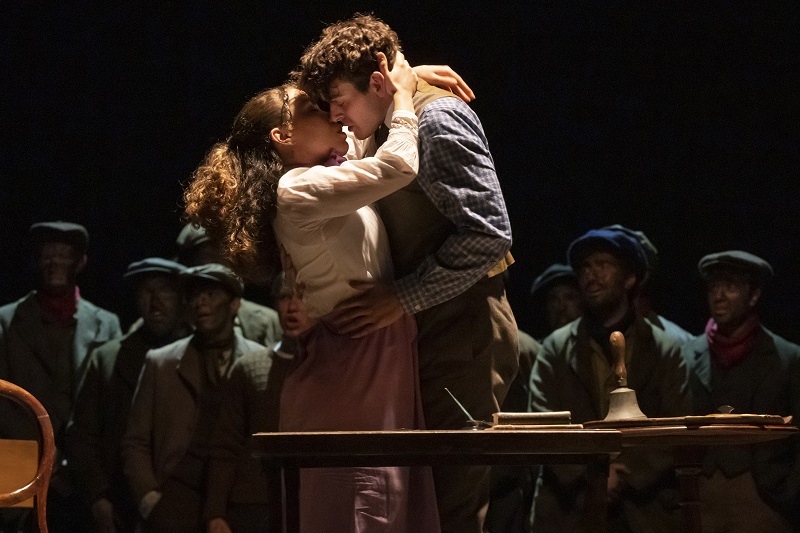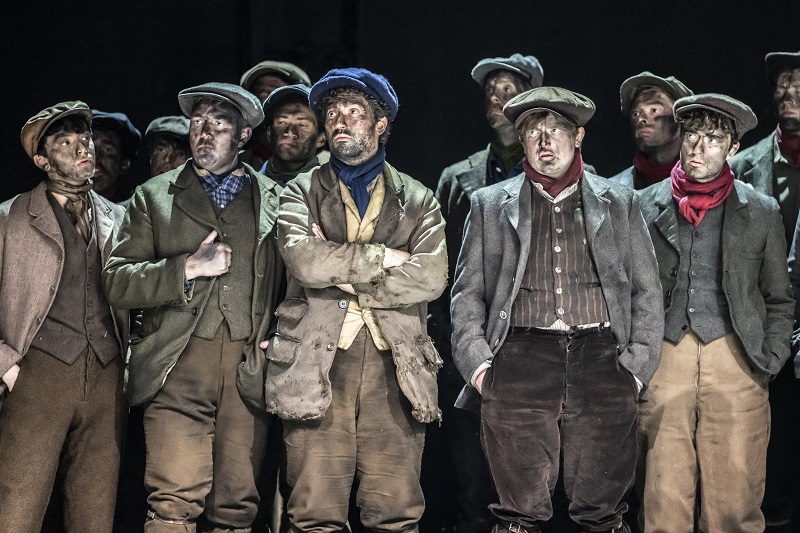“The Corn Is Green” – National’s Lyttelton Theatre
Neil Dowden on the South Bank
27 April 2022
The Welsh playwright Emlyn Williams had a number of his plays premiered in the West End from the 1920s to the 1950s, but in recent decades his work has tended to be overlooked. Probably his best play, The Corn Is Green, which was originally staged in 1938 (then filmed in 1945 with Bette Davies and in 1979 with Katharine Hepburn), is now revived in London for the first time since an Old Vic production starring Deborah Kerr in 1985. Dominic Cooke’s staging of this semi-autobiographical play in the National Theatre’s Lyttelton auditorium is a radical reinterpretation which puts Williams himself centre stage in a show that highlights the creative process of transforming the raw material of real life into art.

Jo McInnes and Saffron Coomber.
Photo credit: Johan Persson.
Williams set The Corn Is Green at the end of the nineteenth century (presumably to maintain a bit of distance from his own life which began in 1905) but here the action has been moved forward to the early twentieth century, in a predominantly Welsh-speaking coal-mining town in north Wales. After English social worker and teacher Miss Moffat arrives she introduces a whirlwind of change when – despite resistance from some in the community with vested interested in the status quo – she opens a school for the local children. She spots the outstanding potential of the rough-edged, working-class boy Morgan Evans, destined for the pits, whom she coaches in an attempt, against the odds, to win a scholarship to Oxford University.
These events closely mirror Williams’s own early life (though a brief sexual entanglement with a girl at his school that threatens Evans’s future is fabricated). Miss Moffat is based on his teacher Sarah Cooke, while Williams himself, though then 33, played Evans in the premiere. What Dominic Cooke has done is to create the character ‘Emlyn Williams’ on stage who is not so much narrator as puppet-master in a framing device that although sometimes distracting ultimately pays off in showing us how the educational opportunity given to a disadvantaged young person bears fruit.

Rufus Wright as the squire.
Photo credit: Johan Persson.
The show starts with silhouetted dancing seen through tall windows at a fashionable 1930s house party, from which bursts a smartly dressed Emlyn Williams in an almost feverish pitch of creative excitement. Inspired by memories of his boyhood, he sits down at a manual typewriter to start writing The Corn Is Green, surrounded by a small male voice choir dressed as colliers who have risen from beneath the stage as if emerging from a coal mine, with his imagination taking flight. He brings into being the characters based on his life story, with his voice overlapping with the actors playing them at the start as he writes their dialogue and sets the scene on a mainly bare stage. For a while he speaks the stage directions with artificial sound effects being produced for the opening and closing of doors, and so on. But as the story progresses and the characters become more self-realized, Williams intervenes less as he fades into the background while remaining on stage.
We see how the determined modernizer Miss Moffat overcomes the obstacles in the backward small town, riven by class and gender inequality, to set up her school and tackle illiteracy. She persuades an unmarried gentlewoman and a religious handyman to help her with the teaching, and eventually even wins over the patriarchal English squire to her cause. Above all, she mentors the talented young Morgan Evans in a Pygmalion-like relationship that has ups and downs as he sometimes bridles against her controlling discipline but which eventually pays dividends.

Saffron Coomber and Iwan Davies.
Photo credit: Johan Persson.
The story is undeniably on the corny side – and the melodramatic treatment of an unwanted pregnancy is particularly problematic – but it has a real emotional resonance in its depiction of social progress and self-development. Cooke’s innovative production gives it an interesting new meta-dimension: inserting the author as a character does slow down the action a bit especially when stage directions are spoken, but the accompanying insights into the relations between fact and fiction, and past and present make it worthwhile. There is an amusing moment late in the show when Emlyn Williams “rewrites” the text in order to produce a better outcome, sending the characters back to an earlier point in the scene, almost like a rehearsal. And there is also a moving interaction between Emlyn Williams and Morgan Evans near the end as the alter egos acknowledge each other’s significance.
Cleverly, the design becomes much more fully realized after the interval as the play’s embodied reality takes over from that imagined by the author. ULTZ’s set then turns into a beautifully detailed presentation of a schoolhouse including book-filled shelves, drawings, blackboard, and desks, as well as snow outside the window. The evocative singing of the miners’ choir (composer, arranger, and music director Will Stuart), who haunt the stage much of the time, adds both local colour and emotional impact.

Ensemble/miners’ choir.
Photo credit: Johan Persson.
In a role usually played by older actresses, Nicola Walker is a surprisingly engaging and humorous Miss Moffat, not the usual redoubtable, eccentric spinster but a social reforming feminist whose no-nonsense, domineering qualities come from a passionate desire to make a difference. In his professional stage debut, Iwan Davies does well in showing how much Morgan Evans changes during the story from a boisterous irreverent lad to a well-mannered and articulate scholar, hungry for a wider life.
Rufus Wright is funny as the condescending, traditional Squire suspicious of egalitarianism whom Miss Moffat co-opts after appealing to his male vanity. There is good support from Richard Lynch as the gloomy John Goronwy Jones and Alice Orr-Ewing as the genteel Miss Ronberry who are Miss Moffat’s loyal assistants. Jo McInnes plays Miss Moffat’s candidly unconventional cockney servant Mrs Watty, with Saffron Coomber as her frustrated, rebellious daughter Bessie. And Gareth David-Lloyd gives Emlyn Williams a strong sympathetic presence, restlessly propelled by his characters as much as they are driven by him.

